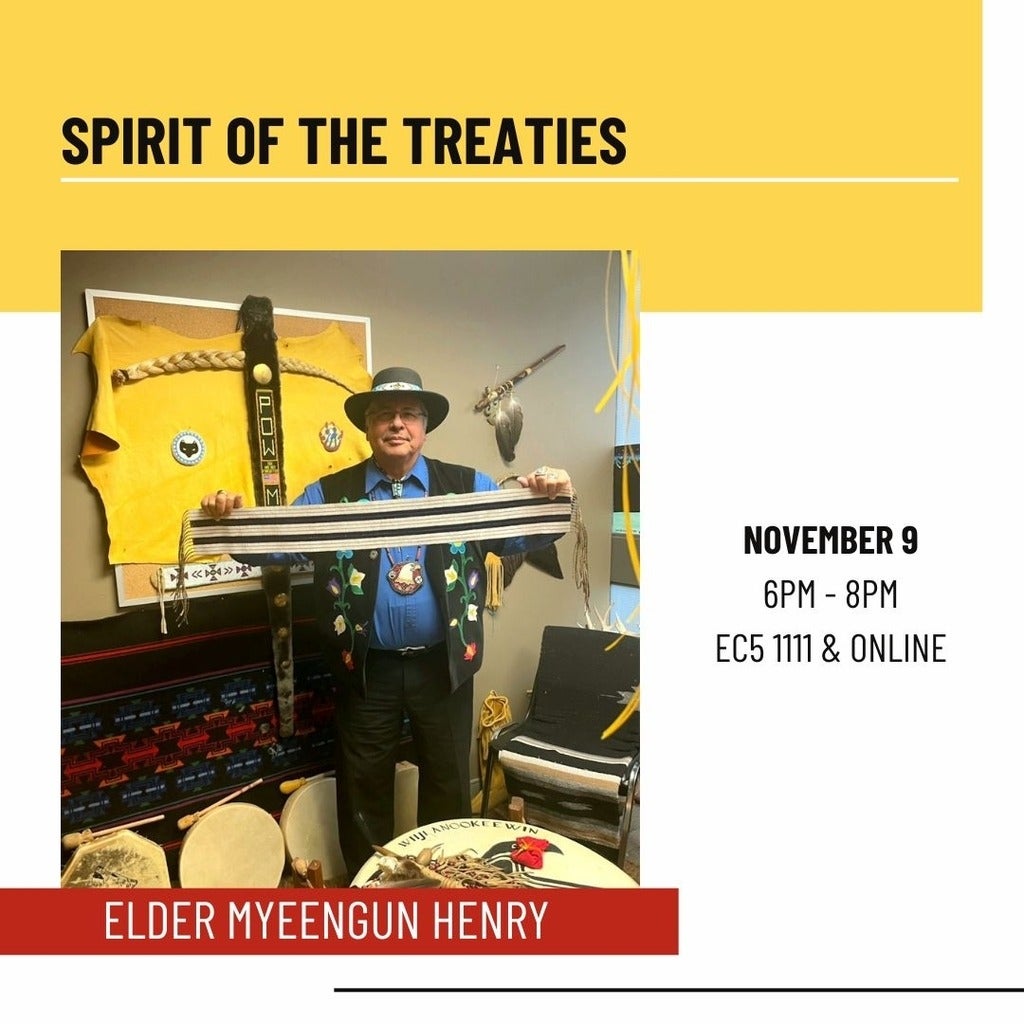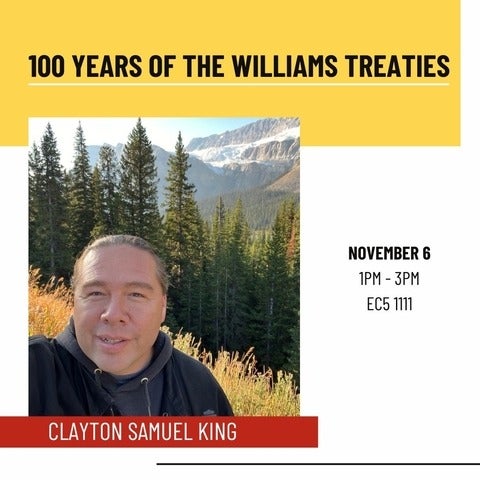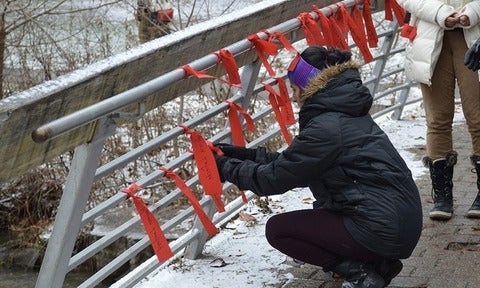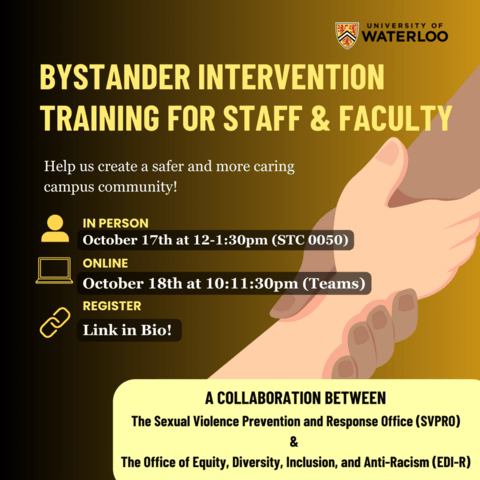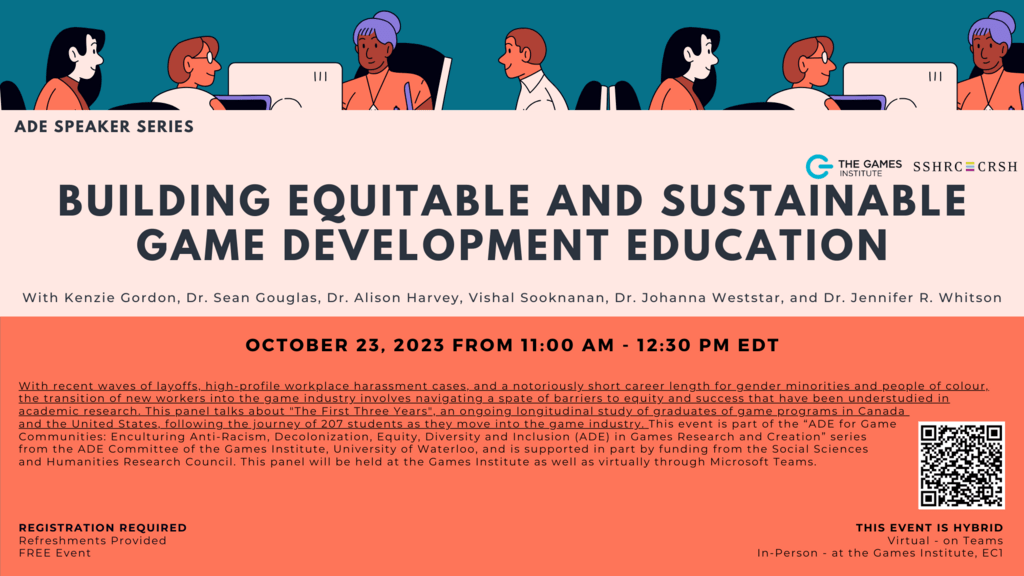In this presentation, Indigenous Knowledge Keeper Myeengun Henry guides attendees on an interactive journey back in time. He discusses how treaties and agreements were spiritually significant, emphasizing the intent and meaning Indigenous folks carried into these agreements.
Staff
Please join us November 6, 1pm - 3pm in EC5 1111.
Clayton Samuel King, Potawatomi from Beausoleil, is an artist, educator, and orator. One of his areas of expertise and passion is the Williams treaties, which effect his home community. In this presentation, Clayton will discuss life before the treaties, 100 years of the Williams Treaties and their implications such as denied rights to hunting and fishing
Conversations about gender equity can be challenging. Not only are there lots of ways that gender inequities can manifest, often making the discussion fractured and complicated, but the personal responsibilities each of us have for collective injustice, and the important real-life impacts of gender inequity can make productive dialogue fraught with dispositional barriers to success.
In this faculty specific lecture, Dr. Jamie Sewell aim's to create some common conceptual ground upon which more productive conversations and work toward gender equity can be built. This lecture will make clear some candidate theories of gender and why investing in the idea of a gender binary is both ethically and empirically problematic. We will also explain the importance of taking an intersectional approach to solutions to gender inequity, and identify some of the most important dispositional barriers to successfully addressing gender inequities.
We've likely all heard at least a bit about the "pipeline" problem in academia. While the need to address the "pipeline" problem and create more diverse institutions is real, it is not the only area of concern when attending to gender inequalities across the University. In this faculty specific lecture, Dr. Jamie Sewell will go beyond the "pipeline" problem to address some ways that we can work toward greater gender equity once more demographically and value-diverse folks have made it onto our campus and into our departments, offices, and support teams.
Topics include the narrative of "value", what it means to be an ally, creating open feedback channels, and more.
Please participate in Bridge: Honouring the Lives of Missing and Murdered Indigenous Women, Girls, and Two Spirit People, an annual installation for 16 Days of Activism Against Gender-Based Violence at the University of Waterloo.
- Opening Ceremony on Friday, October 27 at 10:00 AM
- Closing Ceremony on Friday, November 10 at 10:00 AM
Both ceremonies will take place at the Ceremonial Fire Grounds and the bridge between Environment 3 and United College and will be followed by a catered Soup Lunch and Creative Reflection.
This workshop aims to help students, faculty, and staff understand the historical and contemporary forms of oppression that impact trans and non-binary Black, Indigenous, and racialized identities. Participants will engage in debunking and demystifying conversations regarding trans inclusion, discussing accountability frameworks, and building a toolkit of practices to affirm and uplift trans identities.
Be part of an empowering evening with Changing the Flow and the Women's Centre as we reclaim the narrative and challenge societal taboos. Join us as we Reel over Menstrual Inequity through an interactive screening of "Carrie"
Get ready to break barriers by shouting back at stigma, tossing around provided props, and immersing yourself in Carrie's story through a lens of menstrual equity. It's an experience you don't want to miss!
Discover the connection between Menstruation and Mental Health with hosts Thara Thakidiyil and Adria Joel from Counselling Services.
Join this session as we delve into the impact of gender, disability, and socio-economic status on one's menstrual experience and the effect it can have on mental health. You'll be introduced to eye-opening insights on this important aspect of menstrual equity.
This online session hosted on Zoom is open to all University of Waterloo students, faculty, staff and alumni.
Open to all staff and faculty, in this training, participants will be provided with the skills and resources needed to intervene when they see harmful, or potentially harmful behaviour including racism, sexual violence, or other forms of harm. Active Bystander Intervention has the potential to foster a culture of consent, care, belonging and respect on our campus; encouraging community care.
Using an Equity focused lens, the objectives of this training are to help participants:
1) Understand and define microaggressions, harassment and harm;
2) Recognize the complex roots of these normalized oppressions;
3) Identify personal obstacles and barriers to intervening safely and effectively;
4) Learn how to safely and effectively apply the 5D Active Bystander Model; &
5) Recognize that everyone has a role in creating a safe and anti-oppressive campus.
With recent waves of layoffs, high-profile workplace harassment cases, and a notoriously short career length for gender minorities and people of colour, the transition of new workers into the game industry involves navigating a spate of barriers to equity and success that have been understudied in academic research. The First Three Years is an ongoing longitudinal study of graduates of game programs in Canada and the United States, following the journey of 207 students as they move into the game industry. In this workshop, our research team will summarise the primary challenges students have identified in their game programs. This summary includes equity and diversity issues inherent in common curricular practices such as the efficacy of capstone courses and internships, the inclusion of crunch-like practices in the classroom, the systematic failure to inform students of actual workplace conditions, and the mismatch between student preparation and industry hiring practices. Afterwards, participants will address whether/how these problems manifest in their own institutions, and what solutions might improve equity outcomes for students seeking careers in games.
This event is part of the “ADE for Game Communities: Enculturing Anti-Racism, Decolonization, Equity, Diversity and Inclusion (ADE) in Games Research and Creation” series from the ADE Committee of the Games Institute, University of Waterloo, and is supported in part by funding from the Social Sciences and Humanities Research Council.
- Previous page
- Currently on page 2 2
- Next page
